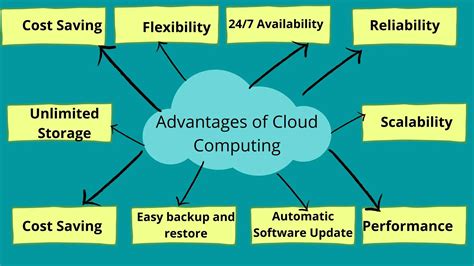Breaking News


Popular News


Learn the economic impact of cloud computing on businesses, including cost-effective solutions, IT infrastructure, security considerations, and measuring ROI. Maximize your business benefits.In today’s digital age, cloud computing has become an integral part of business operations, offering cost-effective solutions and unparalleled flexibility. As businesses increasingly rely on technology to enhance efficiency and productivity, understanding the economics of cloud computing has never been more crucial. In this blog post, we will explore the various aspects of cloud computing and how it directly impacts businesses. From its cost-effective nature to its impact on IT infrastructure, we will delve into the scalability and flexibility it offers, as well as the security and compliance considerations that come with it. Additionally, we will discuss the importance of measuring Return on Investment (ROI) and the overall business benefits of implementing cloud solutions. By the end of this post, you will have a comprehensive understanding of how cloud computing can revolutionize your business operations and provide a competitive edge in today’s market.
Contents

Cloud computing has become a buzzword in the world of technology, but what does it really mean? Essentially, cloud computing is the delivery of computing services – including servers, storage, databases, networking, software, and more – over the internet. Rather than keeping data and applications on a personal computer or local server, businesses can use the power of the cloud to access resources remotely.
One of the key benefits of cloud computing is its scalability. Businesses can easily scale their cloud usage up or down, depending on their needs. This means they can quickly adapt to changes in demand, without the need for extensive hardware upgrades. The flexibility of cloud computing also allows for more efficient resource allocation, ensuring that businesses only pay for the resources they actually use.
When it comes to the security and compliance of cloud computing, businesses often have concerns about the safety of their data. However, many cloud service providers offer robust security measures to protect data from unauthorized access, as well as compliance certifications to meet industry standards. By leveraging the expertise of these providers, businesses can ensure the protection of their sensitive information.
In the world of business, it’s essential to understand the economics of cloud computing. By leveraging the power of the cloud, businesses can optimize their IT infrastructure, drive productivity, and ultimately achieve cost-effective business solutions. This understanding of cloud computing is crucial for businesses looking to stay competitive in the digital age.

When it comes to running a business, one of the main priorities is to find cost-effective solutions that can help maximize efficiency and minimize expenses. With the rise of cloud computing, businesses now have access to a wide range of tools and services that can drastically reduce the cost of operations.
One of the key advantages of cloud computing for businesses is the ability to pay only for the resources and services that are actually used. This pay-as-you-go model allows businesses to avoid the upfront costs of purchasing and maintaining hardware and software, and instead, only pay for what they actually use. This can result in significant cost savings, especially for smaller businesses with limited budgets.
Additionally, cloud computing solutions often come with built-in scalability, which means that businesses can easily adjust their resources and services based on their current needs. This eliminates the need for businesses to invest in excess capacity that may not be used, further reducing unnecessary expenses.
Furthermore, by leveraging cloud computing solutions, businesses can also benefit from reduced IT infrastructure and maintenance costs. With the cloud provider handling the hardware and software updates, businesses can save both time and money that would have otherwise been spent on these tasks.

One of the most significant components of cloud computing for businesses is its impact on IT infrastructure. With traditional on-premise infrastructure, businesses have to invest in expensive hardware, software, and maintenance to support their IT needs. However, with the shift to cloud computing, businesses can reduce their reliance on physical infrastructure and instead use virtual infrastructure provided by cloud service providers. This allows businesses to scale up or down as needed, without the need to invest in new hardware or software.
Furthermore, cloud computing also offers businesses the opportunity to offload many of the cumbersome tasks associated with managing and maintaining IT infrastructure. With Infrastructure as a Service (IaaS) offerings, businesses can outsource the management of their infrastructure to cloud providers, freeing up their IT teams to focus on more strategic initiatives.
Additionally, the impact of cloud computing on IT infrastructure extends beyond cost savings. Businesses can also benefit from improved resilience and redundancy through the use of cloud-based backup and disaster recovery solutions. This ensures that companies can continue to operate in the event of a hardware failure or natural disaster, without the need for a substantial investment in their own redundant infrastructure.
| Traditional IT Infrastructure | Cloud Computing Infrastructure |
|---|---|
| High upfront costs for hardware and software | Pay-as-you-go pricing model |
| Limited scalability and flexibility | Ability to quickly scale up or down based on needs |
| Resource-intensive management and maintenance | Outsourced management and maintenance through IaaS |
In conclusion, the impact of cloud computing on IT infrastructure is substantial, offering businesses a more cost-effective, flexible, and resilient solution for meeting their IT needs.

Scalability and flexibility are two key factors that make cloud computing an attractive option for businesses of all sizes. With cloud-based services, businesses have the ability to easily scale their resources up or down based on demand. This means that they can quickly adapt to changing business needs without the significant investment and lead time required with traditional IT infrastructure.
Additionally, cloud computing offers businesses the flexibility to access their data and applications from anywhere, at any time, and from any device. This level of accessibility is crucial for businesses that have remote or distributed teams, as it allows for seamless collaboration and productivity.
Furthermore, the flexibility of cloud computing allows businesses to experiment with new technologies, services, and applications without significant financial risk. This ability to quickly test and deploy new solutions can provide businesses with a competitive edge and the agility to respond to market changes.
In summary, the scalability and flexibility of cloud computing provide businesses with the opportunity to efficiently and effectively adapt to changing business needs, access their resources from anywhere, and experiment with new technologies to stay ahead of the competition.

When it comes to moving your business applications and data to the cloud, security and compliance are always top of mind. With the increasing number of cyber threats and data breaches, it’s crucial for businesses to ensure that their sensitive information is protected when transitioning to the cloud. This means implementing robust security measures to safeguard your data from unauthorized access, breaches, and other potential threats. Compliance with industry regulations and standards is also a key consideration, as failing to meet these requirements can result in significant penalties and reputation damage.
One of the main advantages of cloud computing is that it provides businesses with access to enterprise-level security measures and protocols that are often far beyond what many organizations can afford to implement on their own premises. Cloud service providers invest heavily in security technologies and best practices, offering multi-layered security measures that include data encryption, network security, access controls, and continuous monitoring. This can provide businesses with the peace of mind that their data is well-protected in the cloud.
However, it’s important for businesses to thoroughly evaluate the security measures and compliance capabilities of potential cloud service providers before making a decision. This involves assessing the provider’s security certifications, data protection policies, regulatory compliance, and transparency in security practices. Additionally, businesses should consider the level of control they will have over their data in the cloud, and whether they can meet specific compliance requirements within the cloud environment.
| Security Considerations | Compliance Considerations |
|---|---|
| Encryption of data at rest and in transit | Adherence to industry-specific regulations such as GDPR, HIPAA, PCI DSS |
| Network firewalls and intrusion detection systems | Transparency and auditability of security controls and access logs |
| Identity and access management | Regular compliance audits and reporting |

Measuring the return on investment (ROI) of cloud computing can be a complex task for businesses. However, it is crucial to carefully analyze the financial impact of cloud adoption to assess its effectiveness.
One way to measure ROI is by comparing the initial investment in cloud infrastructure, software, and services with the cost savings and revenue growth achieved as a result. Businesses can track the reduction in IT expenses, such as hardware and maintenance costs, and calculate the increase in productivity and efficiency due to cloud-enabled collaboration and data accessibility.
Additionally, businesses can evaluate the business benefits of cloud computing, such as improved scalability and flexibility, which can lead to faster time-to-market for new products and services. Cloud solutions also enable businesses to better meet customer demands and leverage new opportunities, leading to increased revenue and market share.
Overall, measuring the ROI and business benefits of cloud computing requires a comprehensive assessment of both the financial and strategic advantages. It is essential for businesses to continuously monitor and optimize their cloud investments to maximize the value and achieve sustainable growth.

What is cloud computing?
Cloud computing refers to the delivery of computing services including servers, storage, databases, networking, software, and analytics over the internet, often referred to as the cloud.
How can businesses benefit from cloud computing?
Businesses can benefit from cloud computing in various ways including cost savings, scalability, flexibility, enhanced collaboration, automatic updates, security, and disaster recovery.
What are the different types of cloud computing?
The different types of cloud computing include Infrastructure as a Service (IaaS), Platform as a Service (PaaS), and Software as a Service (SaaS).
What are the potential drawbacks of cloud computing for businesses?
Potential drawbacks of cloud computing for businesses include security concerns, compliance issues, limited customization, and dependency on internet connectivity.
How can businesses mitigate the risks associated with cloud computing?
Businesses can mitigate the risks associated with cloud computing by implementing strong security measures, carefully selecting cloud service providers, and regularly backing up data.
What are some popular cloud service providers for businesses?
Popular cloud service providers for businesses include Amazon Web Services (AWS), Microsoft Azure, Google Cloud Platform, and IBM Cloud.
What does the future hold for cloud computing in terms of its impact on businesses?
The future of cloud computing for businesses is expected to bring further advancements in technology, increased adoption of cloud-based solutions, and a shift towards hybrid and multi-cloud strategies.